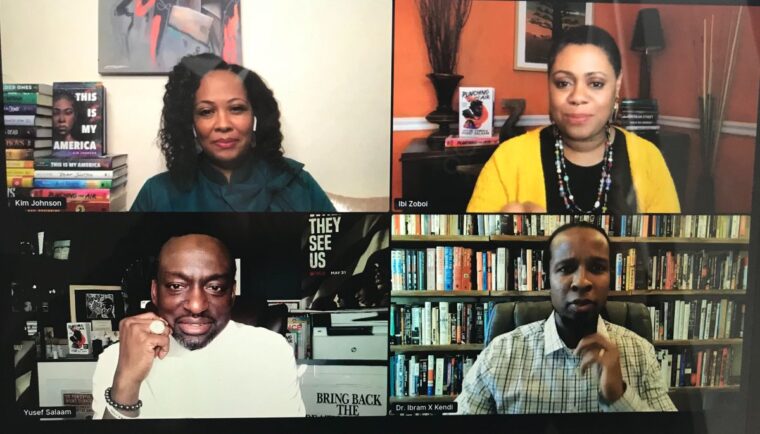From Empathy to Empowerment: #CLEReads Authors Share Advice and Inspiration
The pandemic may have put a hold on in-person events, but it couldn’t dampen the spirits of those who read, write, and love young adult (YA) literature. On December 4, nearly 500 people attended the virtual #CLEReads YA Book Festival and listened in as some of the nation’s most celebrated YA authors discussed writing, craft, […]


The pandemic may have put a hold on in-person events, but it couldn’t dampen the spirits of those who read, write, and love young adult (YA) literature. On December 4, nearly 500 people attended the virtual #CLEReads YA Book Festival and listened in as some of the nation’s most celebrated YA authors discussed writing, craft, advocacy, inspiration, and more.
The daylong virtual festival included five panels featuring more than a dozen esteemed authors, including Dr. Ibram X. Kendi, Justin A. Reynolds, Angie Thomas, and Ibi Zoboi, among many others. The panels addressed literary tropes in YA novels, the art of blending fact and fiction, the inclusion of levity in books that grapple with weighty topics, and the connection between literature and advocacy—a wide-ranging series of discussions that broached urgent, timely topics while also including dashes of love, magic, and laughter.
With a musical introduction from the Rock and Roll Hall of Fame and interludes from DJ Kristyles of WOVU 95.9FM, #CLEReads was a fun, upbeat event designed to connect and inspire young readers.
Below, find a sampling of some of the insightful conversations that made up #CLEReads:
Why books about social struggles are also so much more:
“I worry people will only see this as a book about an issue or a struggle when I want my books to be seen as way more than that. Yes, The Hate You Give is about the Black Lives Matter movement, but it’s also about a young girl finding her power and finding her voice. I don’t write struggle books; I write about young people finding empowerment in the face of struggles.”
—Angie Thomas, author of The Hate You Give and the forthcoming prequel Concrete Rose

On young readers and challenging subject matter:
“So many people think kids and teens aren’t ready for these conversations, but kids are ready for this literature.”
—Dr. Ibram X. Kendi, author of How to Be Anti-Racist
On an author’s personal connection to their writing:
“I’m of the belief that there’s no writing that isn’t personal in some way. You can’t create it in a vacuum. The question is whether we’re borrowing from a memory of a place or time, or are we borrowing from regrets of what we did or didn’t say in a moment? It’s interesting to understand how to plumb all the different parts of your psyche.”
—Adib Khorram, author of Darius the Great Deserves Better
On drawing inspiration from real life in fiction:
“Blending fact and fiction is about respect, to write about people with dignity and not exploit their suffering. Especially when you’re talking about an issue that is very difficult.”
—Aida Salazar, author of Land of the Cranes
Should fiction’s aim be to “humanize” its characters?
“I wrestle with the word “humanizing” because it seemed to suggest [the people portrayed] in fiction are not human. Often, [I worry] this suggests we need to humanize children of color.”
—Jasmine Warga, author of Other Words for Home
On fiction and empathy:
“I wish we could flip it and talk about the ways empathy humanizes us as readers rather than the subject we’re writing about . . . Empathy is not the end goal for fiction. It’s the starting point, the catalyst for transformation.”
—Randy Ribay, author of Patron Saints of Nothing
On literary tropes:
“We so often confuse trope with cliché. But tropes can apply to any story. They’re just narrative devices that you can use to show the reader: ‘I know how stories like this are told, and you know how the story goes, but I’m going to give it a little twist.’ The twist is what makes every individual story exciting.”
—Sarah Enni, author of Tell Me Everything
How an author’s identity can affect expectations within the publishing industry:
“The industry wants different things from Black and Latinx creators—either the immigrant story or the woe-is-me tale, and when you only get that to choose from, it’s unfair. I should be allowed to play around with a trope without getting dinged for it as being cliché—because it’s only considered cliché for certain people.”
—Dhonielle Clayton, author of The Everlasting Rose
On encouraging young writers to experiment in their art:
“Writers and creators: try it all. Not where you feel it should go, but where you feel your heart gravitating toward.”
—NoNieqa Ramos, author of The Truth Is
Finally, some sage advice for aspiring writers:
“As long as you’re writing, or thinking about writing, you are on your way.
—Justin A. Reynolds, author of Early Departures
The #CLEReads YA Book Festival was sponsored by College Now, Verizon, and Jason A. Reynolds. Partners include the Rock and Roll Hall of Fame, Center for Arts-Inspired Learning, and Mac’s Backs Books.
